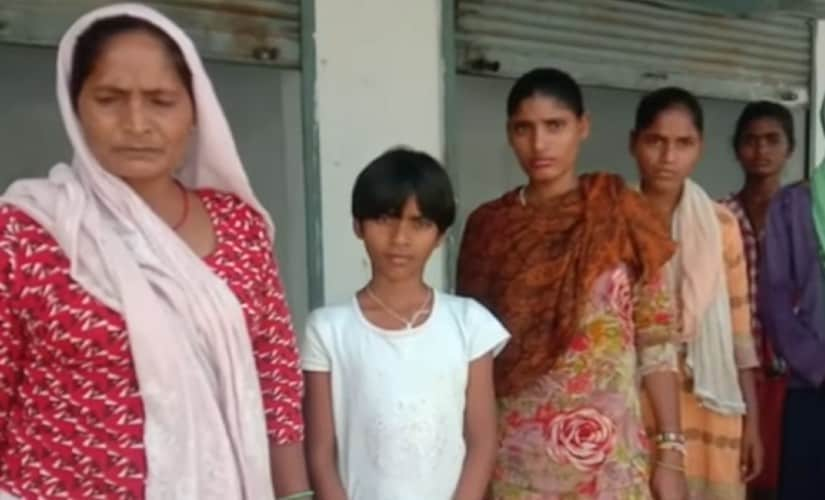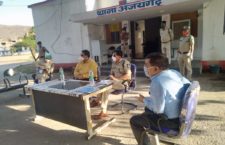A family of wedding-season workers arrived in Bundelkhand region of Uttar Pradesh in the hopes of employment. Instead, the lockdown has put them in a forced exile. It has been over a month since they have been living in makeshift quarters in the Machhli Mandi in Naraini, Banda. With food increasingly becoming scarce, they are appealing to the authorities to arrange for ration or else they will have no option but to start a long walk home.
The family arrived in Bundelkhand before Holi. Hired as daily wage labourers, they only had verbal contracts based on which they made the trek from Lucknow to Bundelkhand.

A screenshot of Launganiya with her family members who had come to Naraini in UP’s Banda district from Lucknow during Holi.
Called ‘baahris’ or ‘outsiders’, their main income has been the seasonal earnings gained by washing utensils and cleaning up during a wedding.
“We are not farmers. We earn our money by doing jobs like these,” says Launganiya, the family matriarch. The wedding season brings seasonal employment like this for many non-farming families. What they earn during the wedding season is usually the bulk of their annual income. The changing Bundeli wedding landscape means people pay ‘baahris‘ so that they can enjoy the ceremonies rather than worry about the preparations and cleaning up.
For Launganiya’s family, it was an annual affair to leave their homes for months and come to Bundelkhand, going from one wedding to another for a small wage and hopefully some tips.
“We are pattal-walas. We clear the used plates and pattals. Wash utensils. But because of the lockdown, the people who called us here told us that they had no work for us. We could go wherever we want. But there’s nowhere to go,” says Launganiya.
Across India a migrant crisis is currently unfolding with the World Bank estimating that 40 million internal migrants have been affected by the lockdown. Stranded in cities and towns with no jobs, they are living in cramped camps where they are reliant on the state to take care of them.
The migrant population that runs pretty much every big Indian city has become a huge blind spot since the Indian government announced a lockdown with no notice. Amidst criticism of how the crisis has been handled, the government is now acknowledging that it did not have the ‘luxury of time’ for deliberation. In smaller towns like Naraini, the migrant population is facing a harsh choice between staying with no guarantee of food and support or braving the virus and the police to return home.
However, according to this report published in The Economic Times, “A survey of nearly 10,000 individuals in rural Bihar by Indian Institute of Technology Hyderabad found that rural migrants who move to urban areas tend to be from relatively well-off social and economic hierarchies. On the other, hand, poorer migrants tended to move to other rural areas.”
So, while the government has finally taken cognisance of the lakhs of migrants stuck in cities and the railways has started the special shramik trains this week to ferry them back to their villages, there is no respite in sight for the migrants such as Launganiya who are at the opposite end of this conundrum.
Pooja, a young member of the family, has a toddler hanging on her arm. Children of varying ages sit and sprawl amongst the Machhli Mandi galis, with nothing to do.
“The government gives us food in the afternoon but the kids start crying from hunger since the morning. What are we supposed to do? We have some ration and we are making do with that. I keep going to the office and the Madam there told me to stop coming because there is no means of sending us back,” she says.
Gurdeen, another member of the family is determined to leave.
“If they cannot arrange a vehicle for us, we will leave on foot. Maybe when we reach the next district or village the police there will throw us in jail, but what else can we do?” she says.
The rooms are dotted with whatever things the family had carried from home. There are some blankets and utensils and not much else. A small amount of ration is kept at one corner.
“Whatever food we got yesterday, we gave it to the kids. Four of us decided to not eat. The kids need it more,” says Launganiya.
Toti, another elder of the family, says they have no rice, flour or vegetables.
An official of the Naraini tehsil, however, said the family has been given one quintal of grain and other ration, and alleges that them claiming lack of food is just a ploy to go back home.
The family has been repeatedly requesting the authorities to provide them with food or else to arrange for them to return home. Stuck in an unknown place, where they know very few people, the family is now scared of what the future may hold for them.
“We have been here for over a month,” says one of the family members.
“Coronavirus has killed us by taking away our work. Now we can’t let our children suffer like this,” adds Toti.
The coronavirus situation has held the world in its grip since December 2019. India’s COVID-19 response has been praised for the extreme lockdown measures but also criticised for under testing a far more important indicator for fighting the virus and to get the economy up and running soon.
As news trickles everyday of drugs like Remdesivir or a possible vaccine by Israel and Italy, there is still no definitive end in sight.
For the poor, the government has announced a 1.7 lakh crore relief package, but it requires having a bank account, access to an ATM or bank and being in a place where one can rightfully claim other benefits like the free gas cylinders.
Launganiya, Gurdeen and their family are stuck in a limbo with nowhere to go and no safety net nearby.
“We aren’t educated and we didn’t know how bad it could get. Or else we would have left for home,” says Launganiya, a statement that many migrants stuck in towns away from home, are probably repeating too.
Co-published with Firstpost.

